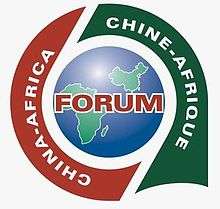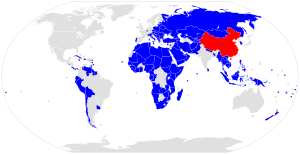Forum on China–Africa Cooperation
The Forum on China–Africa Cooperation (FOCAC) simplified Chinese: 中非合作论坛; traditional Chinese: 中非合作論壇; pinyin: Zhōng Fēi hézuò lùntán; French: Forum sur la coopération sino-africaine) is an official forum between the People's Republic of China and all states in Africa (with the exception of Eswatini). There have been three summits held to date, with the most recent having occurred from September 3–4, 2018 in Beijing, China. The first summit was held November 2006, also in Beijing.

2000, Beijing, China
The first Ministerial Conference was held in Beijing from 10 to 12 October 2000. President Jiang Zemin, Premier Zhu Rongji of the State Council and Vice President Hu Jintao of the People's Republic of China participated in the conference. More than 80 ministers from China and 44 countries and representatives from 17 international and regional organizations attended this meeting. African attendees included President Gnassingbé Eyadéma of Togo, President Abdelaziz Bouteflika of Algeria, President Frederick Chiluba of Zambia, President Benjamin William Mkapa of Tanzania, and Secretary-General Dr. Salim Ahmed Salim of the Organization of African Unity.[1] The conference passed the Beijing Declaration of the Forum on China–Africa Cooperation and the Programme for China–Africa Cooperation in Economic and Social Development.
2003, Addis Ababa, Ethiopia
The second Ministerial Conference was held in Addis Ababa, Ethiopia, from 15 to 16 December 2003. Chinese Premier Wen Jiabao, Ethiopian Prime Minister Meles Zenawi, six African presidents, three vice presidents, two other prime ministers, and one president of the senate as well as President Alpha Oumar Konare of the Commission of African Union and the representative of the UN Secretary General attended the opening ceremony and delivered speeches. More than 70 ministers from China and 44 African countries attended the conference. The Conference passed the Addis Ababa Action Plan (2004–2006).
2006, Beijing, China
The first FOCAC Summit and the third Ministerial Conference were held in Beijing from November 3 to 5, 2006. Hu Jintao, President of China, and heads of state or heads of government from 35 African countries attended this Summit.[2] President Hu rolled out $5 billion worth of concessionary loans to Africa during the summit. As one of the "Eight Measures" for Sino-African relations President Hu announced the creation of the China-Africa Development Fund to further Chinese investment in Africa with US$1 billion of initial funding with its fund expected to grow to US$5 billion in the future.[3]
2009, Sharm el-Sheikh, Egypt
The fourth Ministerial Conference of the FOCAC was held at Soho-Square, in the Egyptian resort of Sharm el-Sheikh on 8 to 9 November 2009. The meeting reviewed how the consensus of the Beijing Summit has been implemented. It also adopted a Sharm el-Sheikh declaration and an action plan for 2010–2012 to chart the path for further China–Africa cooperation. Chinese Premier Wen Jiabao, Egyptian President Hosni Mubarak and African heads of state or government from 49 countries attended the opening ceremony. Also addressing the opening session were the presidents of Liberia, Zimbabwe, Uganda, Sudan, Republic of Congo, Rwanda, Central African Republic, and Tanzania; the prime ministers of Ethiopia, Côte d'Ivoire, and the Democratic Republic of the Congo; the vice presidents of Seychelles, Ghana, and Burundi; the President of the National Assembly of Gabon; and the Chairperson of the African Union Commission.[4] Chinese Foreign Minister Yang Jiechi and Commerce Minister Chen Deming led a delegation to attend the meeting.[5][6][7]
A $10 billion low cost loan was announced on November 9, 2009, double the $5 billion loan announced and implemented at the 2006 Beijing Summit. A 1 billion U.S. dollar special loan for small and medium-sized African businesses was also established. China also announced eight new policy measures aimed at strengthening relations with Africa were "more focused on improving people's livelihoods".[8] Wen announced that China will write off the debt of some of the poorest African nations. He said China will construct 100 new clean-energy projects on the continent covering solar power, bio-gas and small hydro-power and gradually lower customs duties on 95 percent of products from African states with which it has diplomatic ties. He also stated that China would undertake 100 joint demonstration projects on scientific and technological research, receive 100 African postdoctoral fellows to conduct scientific research in China and assist them in going back and serving their home countries. The number of agricultural technology demonstration centers built by China in Africa will be increased to 20, 50 agricultural technology teams would be sent to Africa and 2,000 agricultural technology personnel would be trained for Africa, in order to help strengthen Africa's ability to ensure food security.
China also will provide medical equipment and antimalarial materials worth 500 million yuan to the 30 hospitals and 30 malaria prevention and treatment centers built by China and train 3,000 doctors and nurses for Africa. Wen further stated that China will build 50 China–Africa friendship schools and train 1,500 school principals and teachers for African countries and increase the number of Chinese government scholarships to Africa to 5,500 by 2012. China will also train a total of 20,000 professionals of various fields for Africa over the next three years.[9]
The head of the United Nations food agency, World Food Programme, Executive Director Josette Sheeran praised the forum's role in food security, agriculture and infrastructure in Africa.[10]
2012, Beijing, China
The fifth Ministerial Conference of the FOCAC was held on 19 to 20 July 2012 in Beijing, China. Announcements were made by China for support in investment and lending including a credit line of $20 billion for African countries to build infrastructure, agriculture, manufacturing to support small and medium-sized enterprises in Africa. Also, the China-Africa Development Fund which had been announced during the 2006 FOCAC and established with capital of $1 billion would be scaled up to $5 billion.[11]
2015, Johannesburg, South Africa
The second FOCAC Summit and sixth Ministerial Conference has been held on 4 to 5 December 2015 in Johannesburg, South Africa.[12]
A $60 billion package of aid, subsidized lending, and state backed investment was announced by China. The individual elements of the package were "5 billion dollars of free aid and interest-free loans, 35 billion dollars of preferential loans and export credit on more favorable terms, 5 billion dollars of additional capital for the China-Africa Development Fund and the Special Loan for the Development of African SMEs each, and a China-Africa production capacity cooperation fund with the initial capital of 10 billion dollars."[13]
One of the outcomes of the 2015 forum was the Access to Satellite TV for 10,000 African Villages programme.
2018, Beijing, China
The 2018 summit took place in Beijing in early September 2018. By May 2018, all African UN member states recognised the People's Republic of China as the sole legitimate representative of China, with the exception of Eswatini (Swaziland), which maintains relations with Taiwan. Before the summit, China declared it does “hope that by the time the China-Africa cooperation forum Beijing summit happens, we can have a happy picture of the whole family”, i.e. it hopes to establish diplomatic relations with Swaziland before the summit begins.[14] The government of Eswatini has rejected these overtures from the People's Republic of China[15] It was also reported that more African leaders went to the 2018 summit, than to the similarly timed UN general assembly meeting.[16]
See also
- Africa–China relations
- China-Africa Business Council
- United Nations Economic Commission for Africa
Further reading
- Ian Taylor The Forum on China-Africa Cooperation (FOCAC) London: Routledge, 2012. ISBN 978-0-415-62851-8.
References
- "The 1st Ministerial Conference", Sina.com, 26 October 2006, originally published by Xinhua News (accessed 19 March 2009)
- Kawakami, Osamu. "China rivalry marks TICAD IV / Govt seeks African support on climate change, UNSC membership," Daily Yomiuri. May 31, 1008.
- Yan, Zhou (28 May 2010). "CAD Fund to boost footprint in Africa". China Daily. Retrieved 22 February 2012.
- "Liberia: President Highlights Benefits From China At Fourth Ministerial FOCAC Conference". 9 November 2009. Retrieved 23 August 2017 – via AllAfrica.
- http://news.xinhuanet.com/english/2009-10/27/content_12341880.htm
- http://news.xinhuanet.com/english/2009-11/08/content_12411216.htm
- http://news.xinhuanet.com/english/2009-11/10/content_12420444.htm
- Barney Jopson, Jamil Anderlini (Nov 9, 2009). "China pledges $10 billion in low-cost loans to Africa". The Washington Post.
- "Full text of Wen's speech at 4th Ministerial Conference of FOCAC - China.org.cn". www.china.org.cn. Retrieved 23 August 2017.
- Section, United Nations News Service (9 November 2009). "UN News - Head of UN agency applauds China-Africa forum's commitment on food security". UN News Service Section. Retrieved 23 August 2017.
- "The Fifth Ministerial Conference of the Forum on China-Africa Cooperation Beijing Action Plan (2013-2015)". Secretariat of the Chinese Follow-up Committee of the Forum on China-Africa Cooperation.
- http://www.saiia.org.za/news/focac-background-and-2015-focus-priorities
- "Xi announces 10 major programs to boost China-Africa cooperation in coming 3 years". Xinhua. December 4, 2015.
- https://www.bbc.com/news/world-africa-45271974
- "More African presidents went to China's Africa forum than UN general assembly — Quartz Africa". qz.com. Quartz. 5 October 2018. Retrieved 6 October 2018.
